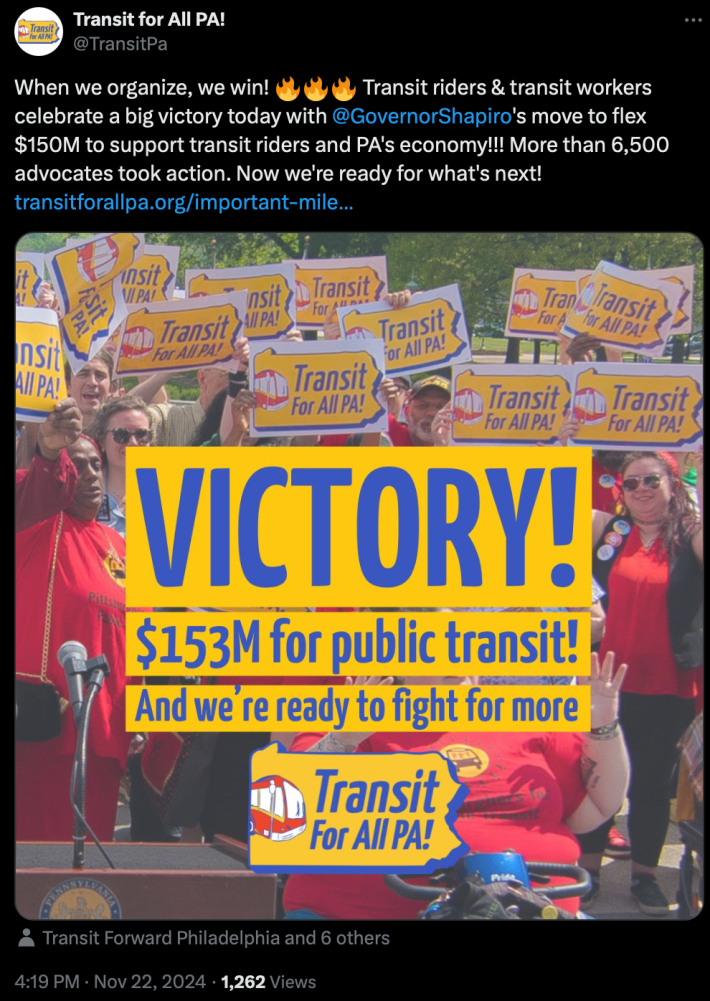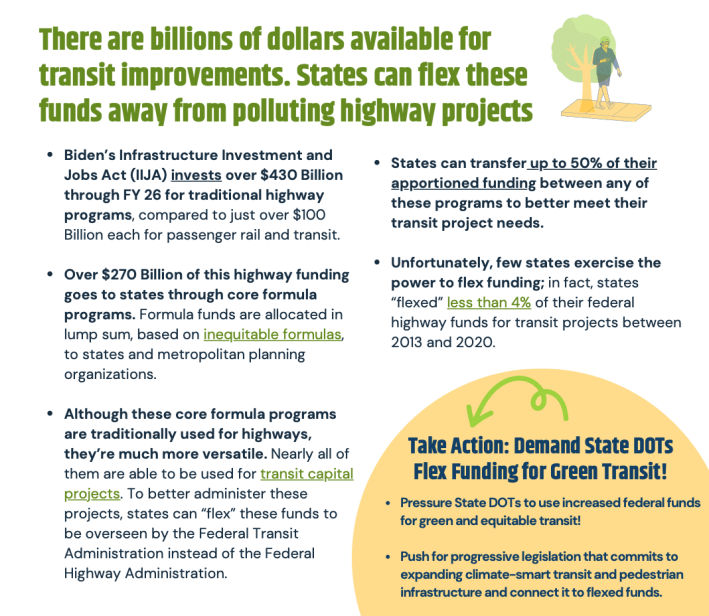The governor of Pennsylvania is demanding that his state's Department of Transportation use money originally intended for highways to save the state's largest transit system — but advocates say other governors could go even bigger in support of non-automotive modes.
Last Friday, Gov. Josh Shapiro threw a lifeline to SEPTA (officially the South East Pennsylvania Transit Authority) by directing the state DOT to shift $153 million in federal highway funding to the beleaguered agency, allowing it to minimize fare increases that advocates feared would have been disastrous for vulnerable communities.

Shapiro had the power to make that bold move thanks to the little-known power of "flex funding," which allows states to transfer money among nine key programs for which they receive guaranteed federal dollars. Those transfers are capped at no more than 50 percent of each program's total budget, and have to meet federal guidelines, as well as securing approval from the FHWA.
Unfortunately, flex funding has historically been used to shunt money away from green modes to subsidize drivers. And when it does benefit sustainable transportation, it's often used as a stop-gap measure in the case of true fiscal emergencies, rather than a more fundamental restructuring of how America funds transportation; indeed, Shapiro's announcement made it abundantly clear that the SEPTA shift was a one-time deal, challenging the legislature to "finally take necessary legislative action" and pass a budget that gives the agency a stable funding source.
Some advocates argue, though, that flex funding could be used to make more enduring investments in sustainable modes — and if states think big enough, they could use it to build the kind of robust mass transit systems that people actually want to ride, so agencies never face the kind of fiscal cliff that SEPTA is facing now.
“This is not just something that happened in Pennsylvania," Green New Deal Network legislative associate Giancarlo Valdetaro, said in a recent webinar. "This is something that has happened in Pennsylvania in the past; this is something that has been happening in states across the country for years. The only [problem] is that, for years, the scale of use for these funds has been [too low]. ... [We need] big bold thinking, along the lines of ‘we need to build a new BRT line — or a system of BRT lines — across our state."

To turn flex funding into a truly transformative tool, climate-conscious governors should redistribute their states' eligible formula funds towards transit capital projects, like bus lanes, bike lanes, and pedestrian safety improvements, Valdetaro and his colleagues said.
And they want President Biden to use his final weeks in office to urge governors to do it — especially before President-elect Trump takes office and has the opportunity to refuse any fund transfers the states might request.
"There are a lot of democratic governors who aren't doing a damn thing on this," said Saul Levin, the Network's Campaigns and Political Director. "They're all talking about how they're a climate champion, they're from a blue state, blah blah blah. … [But] I don't think any of us want to hear that until they're actually moving money towards transit that serves low-income folks, and Black and brown and Indigenous communities, and the care workers who primarily benefit from [these modes]."
Even if states won't use flex funding to supercharge their green capital projects, though, advocates say they should at least follow Pennsylvania's lead and use it to temporarily subsidize transit operations — especially since so many other agencies are facing fiscal cliffs, too. And in the process, the move could shock legislatures into confronting the structural reasons why so many systems have been pushed to the brink.
“It's a really effective political tactic to compel our some of our republican and rural legislators to [come to] the table for a broader funding solution," said Laura Chu Wiens, executive of Pittsburghers for Public Transit, who organized with colleagues across Pennsylvania for the recent shift. "We're looking at another big legislative fight in the spring, but … [lawmakers] don't want this to continue happening, where money is being pulled from highways to fund transit. So I think they have a vested interest in actually negotiating now.”
Next, the Green New Deal Network will be focusing its energies on Illinois, where the Chicago Transit Authority is facing a death spiral of its own — and they plan to follow the playbook of the Pennsylvania advocates who barraged Shapiro's office with more than 3,500 emails. In the meantime, though, the group hopes advocates from every state will pressure their governors to stop blaming their lack of transit funding on Congress, and start flexing their muscle to change the status quo
“If your governor says they don't have money for transit, they are lying," said Levin. "They're lying to your face; they're lying to communities; they're lying to climate organizers. ... They're either lying, or they don't know [about flex funding]. Because every state has some money to improve transit right now.”






